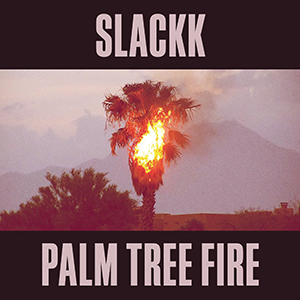Slackk Palm Tree Fire
The past year or so in UK dance music has been marked by the rapid […]

The past year or so in UK dance music has been marked by the rapid ascendance of a new wave of instrumental grime producers, many of whom are affiliated with London’s monthly Boxed clubnight. Slackk (a.k.a. Paul Lynch), a Boxed co-founder, stands as one of the most consistently inventive and forward-thinking of these figures, but he actually began honing his craft well before grime was hit with this recent swell of critical popularity. Since 2010, he’s released records on labels such as Numbers, Unknown to the Unknown, and Local Action, and he also heads up the archival Grimetapes website. Now, he’s put together his debut album, Palm Tree Fire.
Like last year’s Failed Gods EP, the new LP is out on the UK’s Local Action label, and it finds Slackk offering up 16 tracks of intricate, evocative grime that are firmly in the lineage of the romantic instrumentals pioneered by cult grime crew Ruff Sqwad during the early-to-mid 2000s. Where Lynch’s previous releases often drew a relatively clear distinction between more conventional, aggressive tracks and the occasional foray into atmospheric mood music, Palm Tree Fire cohesively blends these two impulses—many tracks retain the abrasive stance that’s so integral to grime, but they also introduce new layers of complexity into the genre’s sonic vocabulary.
The album’s opening title track is a testament to this newfound sophistication. Pairing a woozy 8-bit synth line with staccato snare hits, the tune achieves a balance between cold and warm that grime producers often strive for but rarely pull off this well. Many of Palm Tree Fire‘s tracks betray a vaguely Eastern sensibility—a nod to grime tradition in the form of what Kode9 once dubbed ‘sinogrime,’ a strain of the genre featuring Asian-influenced melodies and stretching back as far as Wiley’s early productions, most notably “Shanghai.” Hewing closest to that template here is the tellingly named “Three Kingdoms,” which uses pan flute, delicately plucked notes, and a scuffed, uneasy rhythm to evoke an eerie, future-forward mysticism. Similarly, “Puma Walk”—another album highlight—interweaves multiple uneasily pitched synth lines over strutting drums. These kinds of tracks suggest a deep knowledge of grime’s history, which isn’t exactly surprising given Lynch’s prior experience as a producer, not to mention his clear dedication to archiving and documenting the scene. Still, it would have been easy for this sort of attention to historical detail to come across as clinical, but Palm Tree Fire‘s sonic inventiveness ensures that the music is much more than a nostalgic exercise.
The galvanization of London’s new breed of grime artists around Boxed has resulted in some dazzlingly innovative music from a genre that five years ago looked dead in the water. But while this resurgence is undoubtedly charting new territories for the genre, it also has a tendency to celebrate innovation for innovation’s sake. Slackk’s debut album isn’t immune from this, and does have some moments that feel too artful or too refined (the mournful strings and juddering rhythm of “Jackal,” the lethargic desert soundscapes of “Litherland”), but on the whole, the LP is an impressive achievement. Lynch has created a fully realized, statement-like grime album that shows just how much the music has evolved from its roots in the housing projects of East London.

